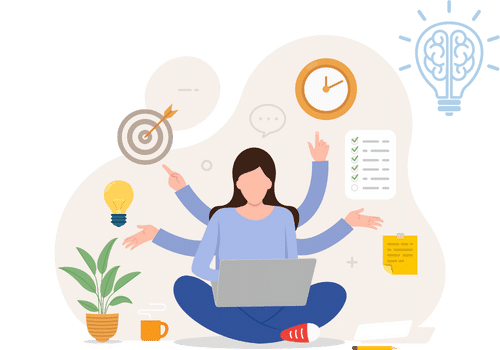What Is Self-Management?
The ability to regulate one’s thoughts, emotions, time, and behaviors to effectively achieve goals. It involves maintaining discipline, setting priorities, and adapting to challenges while staying productive and focused.
It is a core component of executive function and is essential for success in academics, work, and daily life.
Why Is Self-Management Important?
Strong self-management skills contribute to:
✅ Increased Productivity
Efficiently managing time and energy leads to better task completion.
✅ Improved Emotional Regulation
Handling stress and frustration prevents impulsive decision-making.
✅ Better Goal Achievement
Staying focused and organized helps turn long-term goals into reality.
✅ Enhanced Decision-Making
Evaluating priorities and managing distractions leads to smarter choices.
✅ Stronger Adaptability
Adjusting to setbacks and challenges improves resilience.
How Self-Management Relates to Executive Function
These skills rely on several key executive function skills:
- Task Initiation: Starting tasks efficiently without procrastination.
- Impulse Control: Resisting distractions and staying on task.
- Time Management: Organizing tasks and scheduling effectively.
- Emotional Regulation: Managing stress and frustration productively.
- Self-Monitoring: Tracking progress and adjusting strategies when needed.
Common Challenges in Self-Management
Many individuals struggle due to:
- ⏳ Procrastination and difficulty initiating tasks.
- 🚧 Poor time awareness and ineffective planning.
- 🔄 Difficulty prioritizing and managing competing responsibilities.
- ⚠️ Emotional reactions interfering with decision-making.
- 📉 Lack of self-discipline and follow-through on commitments.
Effective Strategies for Strengthening Self-Management
Improving these skills involve building habits that promote structure, discipline, and adaptability. Here’s how:
✅ 1. Use a Structured Planning System
Use planners, to-do lists, or digital calendars to organize tasks and deadlines.
✅ 2. Set SMART Goals
Ensure goals are Specific, Measurable, Achievable, Relevant, and Time-bound to maintain focus.
✅ 3. Develop Daily Routines
Establish habits that create consistency, such as a morning routine or scheduled focus periods.
✅ 4. Prioritize Tasks Effectively
Use the Eisenhower Matrix to separate urgent tasks from less critical ones.
✅ 5. Manage Distractions
Identify common distractions and create an environment that minimizes interruptions.
✅ 6. Practice Self-Monitoring
Regularly reflect on progress and adjust strategies as needed.
✅ 7. Use the “Two-Minute Rule”
If a task takes less than two minutes, do it immediately to prevent buildup.
✅ 8. Implement Time-Blocking Techniques
Designate specific blocks of time for focused work to enhance efficiency.
How Executive Function Coaching Can Help with Self-Management
For individuals struggling with self-management, executive function coaching offers personalized strategies to enhance organization, time management, and productivity. Coaching can assist with:
- 🔹 Identifying obstacles to self-discipline and goal achievement.
- 🔹 Developing personalized systems for managing time and tasks.
- 🔹 Strengthening emotional regulation and stress management techniques.
- 🔹 Improving follow-through and accountability.
By mastering self-management, individuals can improve efficiency, reduce stress, and achieve long-term success.
📞 Want to strengthen your self-management skills? Contact us for executive function coaching today!




